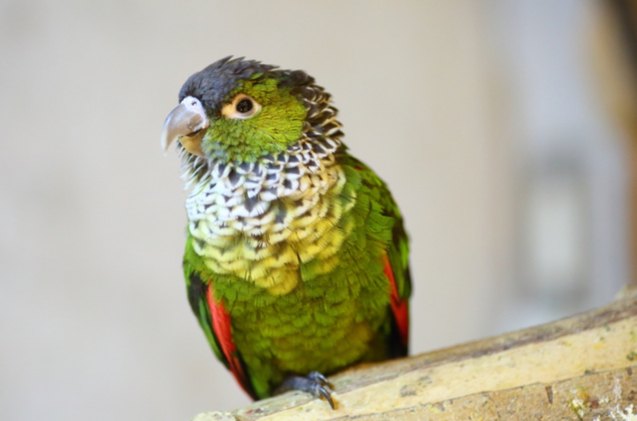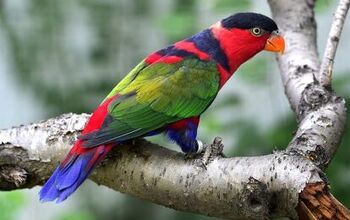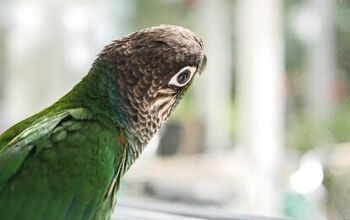Black Capped Conure


About Black Capped Conure
With their unique looks, vibrant patterns and a friendly, silly personality, the Black Capped Conure has found its way into the hearts of many owners. With a friendly, docile and often goofy temperament, these little birds boast a lot of traits that make them perfect pet parrots. They are easy to take care of and can be a perfect choice for beginner owners. Additionally, these little parrots are considered as one of the quieter conure breeds. Owners who live in apartments can rest easy – the Black Capped Conure is a quieter bird with well-rounded traits.
Black Capped Conures is one of the most unique-looking breeds of this family. As a bonus, they are very friendly and entertaining.
These are one of the iconic birds of the southern Amazon River basin. Their habitat also covers the Andean slopes and spans a region that includes parts of Brazil, Peru, and Bolivia. They thrive in the humid forests of the region, and can also be found in the Amazon lowlands, but also on the slopes of the Andes, where flocks can be seen even at altitudes of up to 2000 meters. Sadly, this breed is near threatened, due to the increasing displacement and destruction of their pristine habitat. In the wild, these parrots will sometimes interbreed with Green Cheeked Conures, producing mixed, hybrid parrots.
Even though they are largely similar to other closely related conures in physical appearance, the rock conures, as they’re also known as, are one of the smallest in the species. Black Capped Conure flaunts a host of unique and distinguishing features, making them easy to recognize. The adults reach an average length of 10 inches (25 centimeters) and can weigh around 2.5 ounces (70 grams). They have moderately sized tail feathers and can be generally considered as medium-sized parrots. Conures are very energetic and will require a plenty of space. They like to hop about and “transform” household items into their new toys. To prevent boredom and depression, you need to ensure a spacious cage and a lot of time out of it.
Conures can sometimes be loud and expressive with their natural calls and goofy mimics. But, before apartment dwellers get disappointed, you should have in mind that the Black Capped Conure is among the quieter breeds of the species. They still possess their jolly natural calls, but they are moderate and easy to tolerate and occur most often at sunrise and sundown. Conures are not the best talking parrots, so don’t expect much when it comes to your new pet’s vocabulary.
Conures are not always colored in an exotic fashion, but Black Capped Conure has a lot of intricate details that give them their own, special charm. The body is mostly colored in a deep green. The cheek area is brownish green, while the top of the head and the nape are black, giving them their name. One of the unique details is on the collar and upper chest – an intricate pattern of black and white feathers that resemble scales. Wing edges are bright red, and the lower tail is black. Add a black beak and feet into the mix, and you get a truly charming little parrot with a lot of details that stand out.
Their intricately patterned chest feathers are a detail unique to a Black Capped Conure.
To easily begin a balanced and full diet, you should start first with a seed-based mix designed for conures. It contains and replicates all the nutrients of their diet in the wilderness. It is mostly full of millet, oats, nuts and sunflower seeds. The next step is a regular intake of vitamins through fresh fruits and vegetables. Occasionally, cooked foods like rice or chicken breast can also serve as a good source of protein. Since conures really like to chew and exercise their strong beaks, a cuttlebone is a recommended addition to their cage.
Although their modest size doesn’t give off that impression, these parrots have little issues with their health. Sometimes, their entire lifespan of 30 years can pass without any health issues at all. Of course, you should make sure to meet all of your pet’s needs. One of the things to remember is to provide enough mental stimulation and social interaction. A bored Black Capped Conure can become lonely and, in turn, begin to pluck his own feathers. If not taken care of on time, this problem can grow out of proportions.
These intelligent and friendly parrots will require your friendship. Provide a lot of social interaction to avoid a lonely and neglected bird.
One of the friendlier breeds, these conures are a perfect playful pal and are full of positive energy. They are noted for bonding with their family and showing a timid and docile side when guests are in the house. One of the reasons behind their popularity is their clownish personality – they love to play, invent new tricks and hop around the house in a truly silly fashion. It’s this friendly and truly great personality why so many families fall in love with the Black Capped Conure. And who knows, you might be the next in line!
Photo credit: feathercollector/Shutterstock; Fure/Shutterstock; Kevin Autret/Shutterstock

A proud mama to seven dogs and ten cats, Angela spends her days writing for her fellow pet parents and pampering her furballs, all of whom are rescues. When she's not gushing over her adorable cats or playing with her dogs, she can be found curled up with a good fantasy book.
More by Angela Vuckovic

























